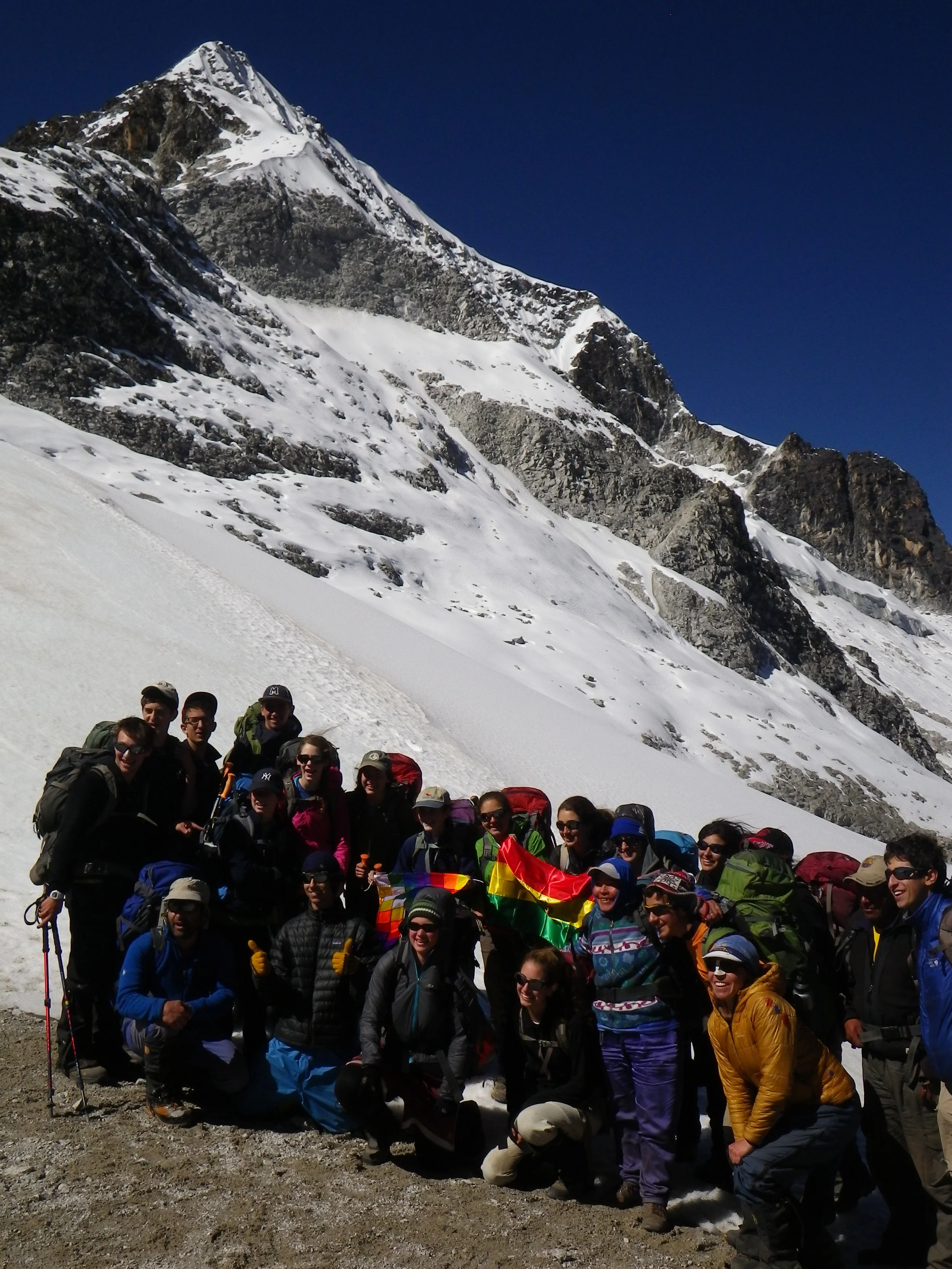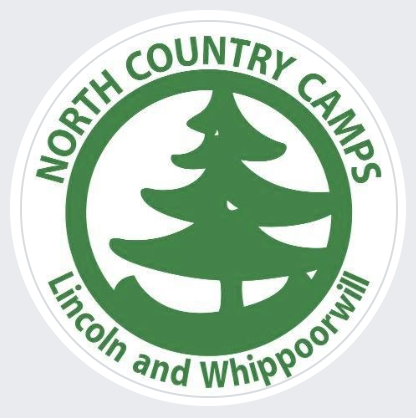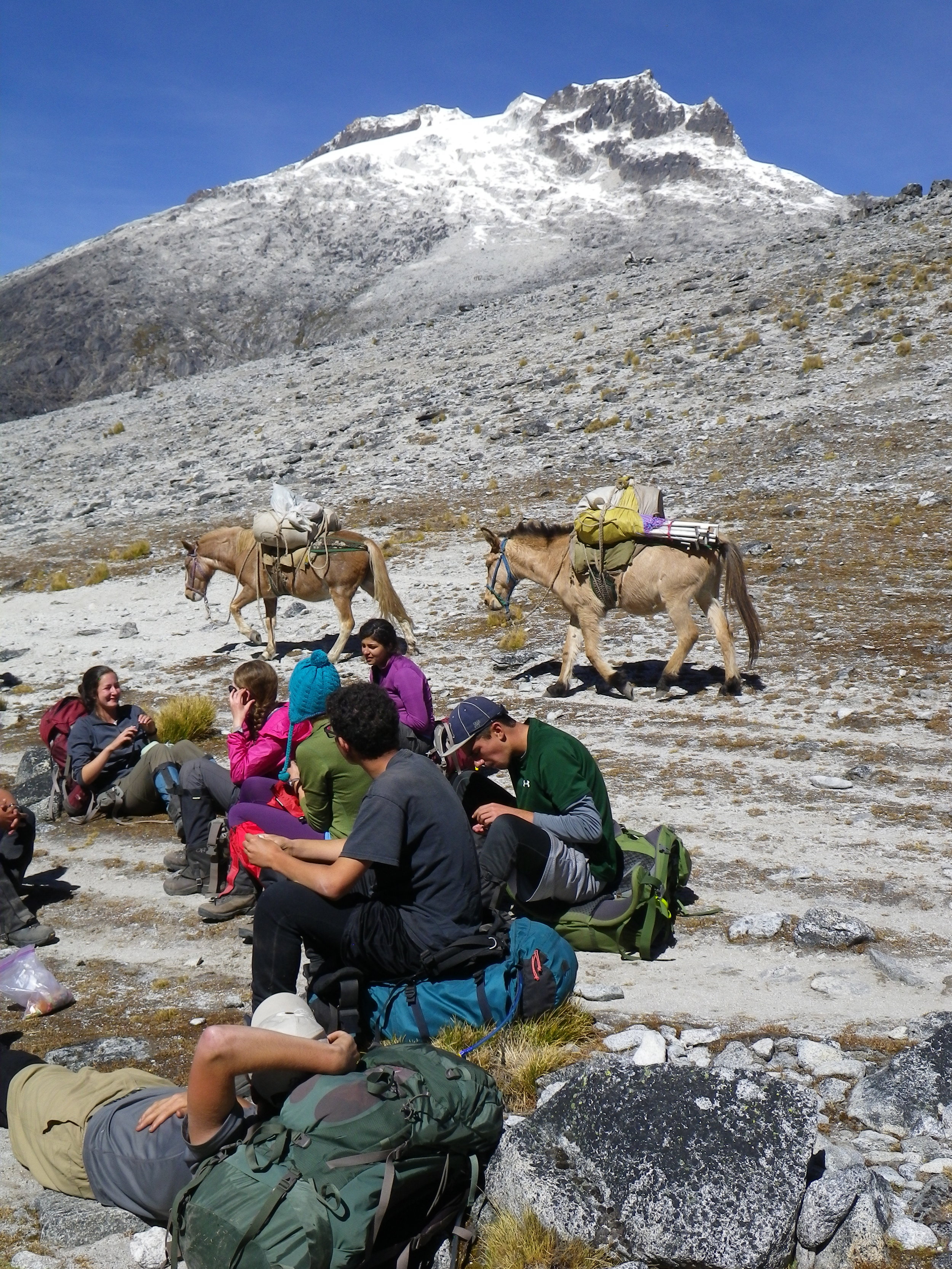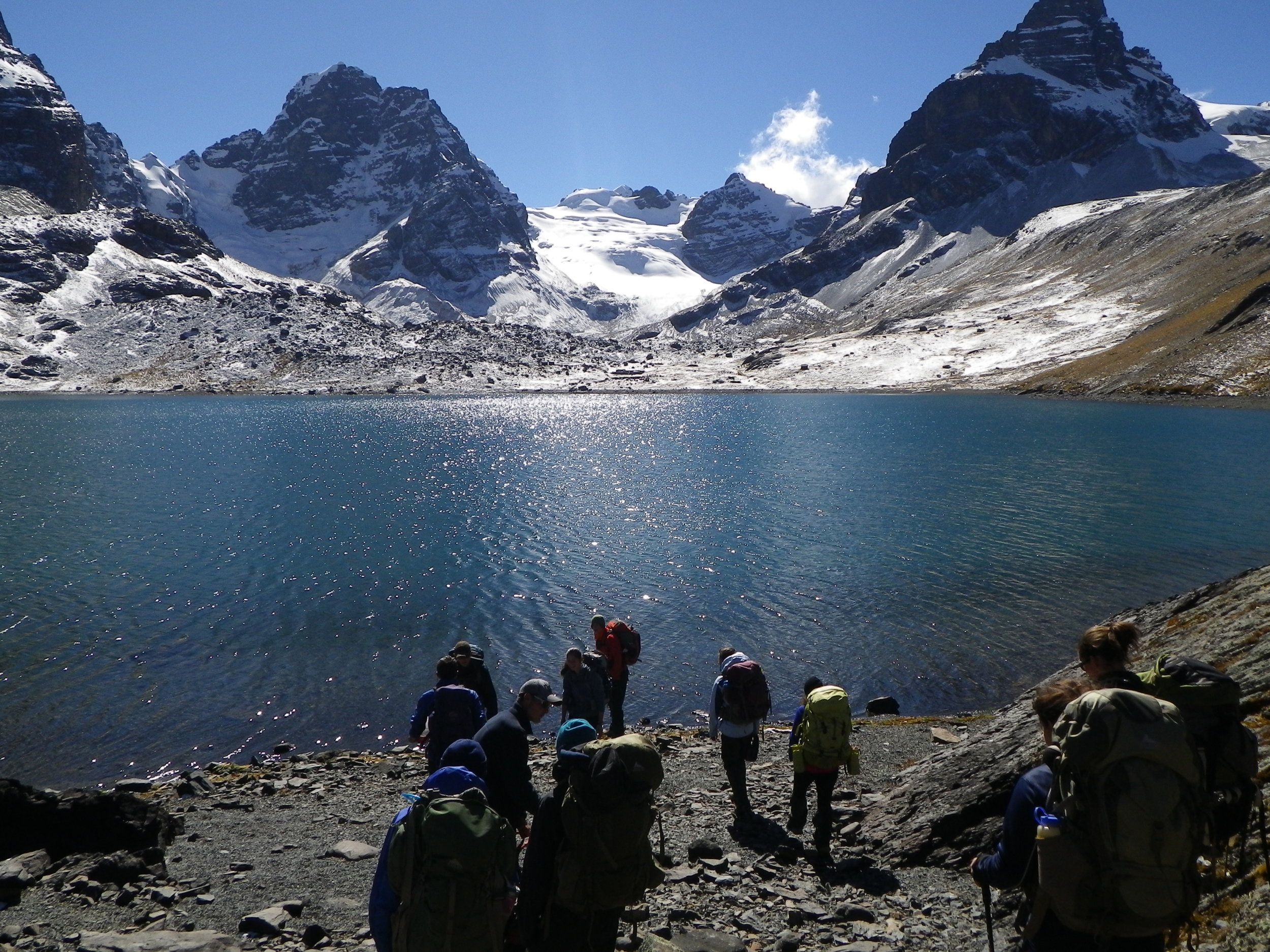Program:
Patagonia Frontiers designed and instructed various North Country Camps graduation trips for groups of 15 and 16-year old students. The original capstone trips were month-long courses in Bolivia, the Andes to Amazon Adventure®, and expanded to include courses in Alaska. The graduation course allows NCC campers to draw on much of what they have learned with North Country Camps over the preceding eight years. The educational experience is also an opportunity for NCC workgroup members to spend one additional summer together on an extended expedition before heading in new directions as NCC graduates.
The North Country Camps - Lincoln for boys, Whippoorwill for girls - offers to the urban and suburban child real wilderness adventure blended with the development of many athletic, creative and social skills; strong community spirit that emphasizes working together and doing your share; the freedom and accompanying responsibility of learning to make your own choices; and the sheer joy of simple, down to earth, outdoor living and playful fun.
Student curriculum includes leadership and communication training, extended wilderness travel and navigation skills, basic first aid, expedition planning, introductions to mountaineering, flora, fauna and environmental studies, along with ample cultural opportunities. Each area of focus includes personal and group development, and reflection. Students tent camp, carry their own food and equipment, and prepare their own meals for the duration of the course, moving camp each day with classes and periodic rest days.
What students had to say:
“I realized not only could I push myself to do more; I want to push myself to do more.”
“I learned that sometimes having to push through challenges actually makes them easier to handle.”
“Being in the natural world for so long with my friends helped me learn to appreciate the outdoors and to value my friendships. And it made me want to travel in the outdoors more.”
“This trip made me realize that challenges are much more rewarding when you complete them with your friends. The greater the challenge the more you appreciate and remember the small moments with the people you’re close to.”
“When I got to the end of the trip, I realized that I want to do a lot more of this sort of thing on similar trips to this one in the future.”
“Yesterday, I could have told you all of the hard stuff but sitting here today I can only think of all the amazing stuff!”
“I participated on this trip 8 years ago. It was an experience that was very formative for my 15-year-old self and is something I have reflected upon frequently since. The memories of that trip have kept me good company over the years.”
Program Itinerary:
Traverse the high passes of the Andean landscape, climb a peak, work with local schools, mountain bike down from the Altiplano, explore the upper reaches of the Amazon basin by long boat and dugout, and swim with freshwater dolphins. This diverse and challenging program asks much of participants and affords much in return.
*The route is approximate. Alternative routes and travel/rest schedules may be used depending upon the educational and cultural opportunities that arise, and due to considerations including weather, route conditions, group health, skill level and teamwork.
Day 1: Depart on overnight international flight from U.S.A. to La Paz, Bolivia.
Day 2: Arrive La Paz. General orientation and gear check. Overnight in a hostel, La Paz.
Day 3: Acclimatization and expedition preparation day including an additional orientation, rations purchase and logistics review. Overnight in a hostel, La Paz.
Day 4: Early departure for Copacabana on Lake Titicaca with a visit to the Aymara and Catholic Sanctuary, Virgin of Candelaria, sight of Bolivia’s largest yearly religious pilgrimage. Afternoon travel to the famous Isla del Sol by motor launch. Overnight in Challapampa.
Day 5: Spend the day hiking to the southern end of Isla del Sol with the high Andes stretched out in panorama. Visit ancient ruins and ceremonial sites, stop for a game of soccer or Frisbee, and spend the night in the village of Yumani near the crest of the island’s main ridge.
Day 6: Boat back to the mainland in the morning, take a vehicle shuttle to the town of Sorata at the edge of the Cordillera Real Norte. Trekking orientation and equipment check. Overnight in Sorata.
Day 7: Begin extended trek and mountain section. Drop-off by 4x4 vehicle in the tiny village of Jankhouma. Overnight tent camp.
Day 8: Breakfast and morning classes, trek over Korhuasini pass and descend to the valley of the same name near the hamlet of Cocoyo. Evening social visit or soccer game. Overnight tent camp.
Day 9: Continue the traverse through the Cordillera Real by crossing Sarani Pass, nestled between snow-covered peaks. Overnight camp at Chocolpaya.
Day 10: Traverse Keakeani Pass at 14,700 feet. Overnight camp at Negruni.
Day 11: Continue the route on to Lloco-Lloco pass at 15,500 ft. Overnight tent camp.
Day 12: Built in class day/rest day though the date and location is not fixed.
Day 13: Depart for Jankhokota Pass at 16,300 ft. and descend in the afternoon to Laguna Khotia. Overnight tent camp.
Day 14: Continue the traverse of the range to Laguna Ajwuani. Overnight tent camp.
Day 15: Traverse the Lanchallani and Jurikhota passes, both at 16,000 ft. Overnight tent camp.
Day 16: The group nears the end of its Andean traverse by crossing the highest pass of the route at 17,050 ft. After descending to Laguna Chiarkhota, a camp is established from which activities will be based for the next several days.
Day 17-20: Spend the next few days teaching and practicing the skills required for ascents of nearby Pico Ilusión (17,500 ft.) and Pequeño Alpamayo (17,620 ft.), or other appropriate peaks. Break camp and hike out to La Rinconada road head. Vehicle transfer back La Paz. The afternoon is spent cleaning up, cleaning gear, program evaluations, e-mail and a big meal out. Overnight at a hostel, La Paz.
Day 21: Morning transfer by vehicle to the beginning of the mountain bike descent. Begin the ride at 15,300 ft. passing through the village of Unduavi and continuing down to the Cotapata National Park. There will be periodic equipment checks of bikes during the descent, as well as vehicle support at periodic points along the route. Lunch is planned for in Unduavi where the NCC team will have the opportunity to challenge the local school in a friendly game of soccer. The ride ends in Yolosa at 3,900 ft. offering an amazing descent of 11,000 ft. Overnight at a hostel in Coroico.
Day 22: Today the group descends from the high Andes to the lowlands. Drop into the Amazon basin by vehicle transfer to the village of Guanay on the Kaka River, one of Bolivia’s most important and largest rivers and a natural highway for transportation through the Amazon. Overnight in a hostel, Guanay.
Day 23: Board motorized long boats and travel the Kaka River to the jungle village of Myaya. Be on the lookout for the many wild animals that live along its banks including capybara, tapir, caiman, giant anteater, collared peccary, howler and spider monkeys, bats, hawks, fish eagles, egrets, kingfishers, Blue Morpho butterflies, Blue and Red Macaws, and many other birds. Overnight tent camp, near the village of Myaya.
Day 24: Continue the jungle journey by motorized long boat to the river town of Rurrenabaque. Overnight in a local hostel.
Day 25: Depart Rurrenabaque in 4x4 vehicles and be prepared for rough, dirty travel. It is common that groups need to pitch in to clear logs from the track and push vehicles through muddy sections on the journey to Santa Rosa de Yacuma. Continue by motorized dugout along the Pampas River throughout the afternoon to our jungle camp. Later, head out for a special night hike accompanied by local indigenous guides.
Day 26: Today is a unique opportunity to explore the jungle, hiking through flooded plains and forest, and seeking views of the local fauna, including the elusive Anaconda. Return to camp by sunset for an evening fire.
Day 27: Awake to the songs of birds and the chatter of monkeys. Navigate the river or hike in the jungle forest again before returning to Puerto Yacuma and the Rurrenabaque airport for our return flight to La Paz. Overnight in a hostel, La Paz.
Day 28: Transfer to El Alto airport and the international flight out to U.S.A.
Day 29: Arrive final destination.
Gallery:
Patagonia Frontiers Philosophy:
“To contact the deeper truth of who we are, we must engage in some activity or practice that questions what we assume to be true about ourselves.” ~A.H. Almaas
We design and lead wilderness education and leadership programs. Our educational programs work with high schools, universities, camps and other organizations to provide logistics and risk management oversight for the institution's established program or through our own outdoor, leadership and science curriculum.
Our mission is to advance outdoor education and conserve wilderness classroom, serving as an ally for the surrounding parks and communities. We create learning environments that invite students to expand their view of what is possible, both as an individual and as a group. Our intent is for students to gain knowledge, courage, and techniques necessary for implementing beneficial change, and the enthusiasm to positively impact our world and be dreamers and doers in their own lives.
"When we know that the animals and plants are part of who we are, we can listen and respond. Ignoring the trees is like ignoring our lungs when they are congested and we can't breathe. Extinction of the songbirds means the end of our living music. When the planet herself calls to us in our dreams, if we are in touch with the truth of our mutual belonging, our hearts naturally stir with care. We remember that the web of life is our home." ~Tara Brach, excerpted from Radical Acceptance: Embracing Your Life with the Heart of a Buddha
